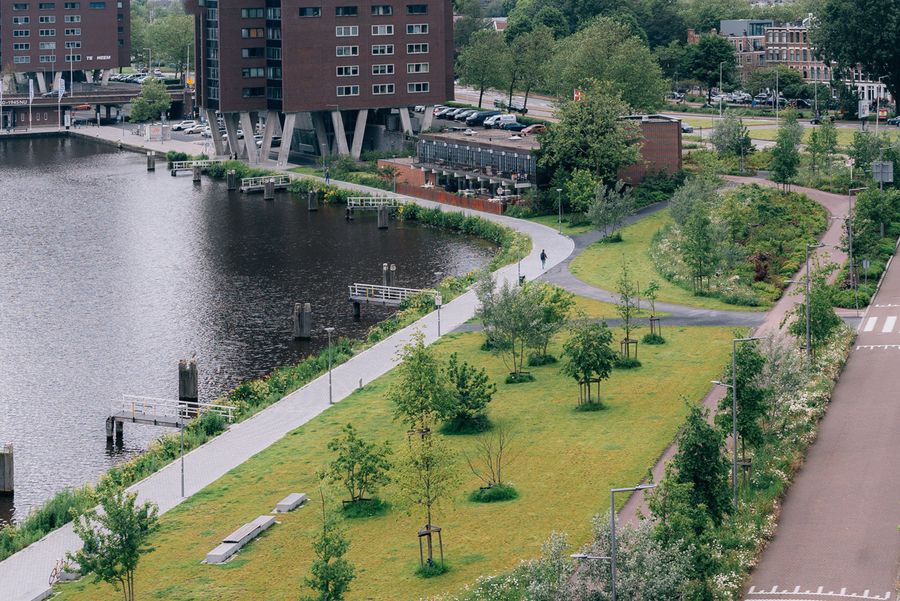Climate adaptation
Climate impact mitigation
Ecosystem-based solutions
Climate justice
Nature-based solutions
This subtopic focuses on the implementation of nature-based solutions (NBS) to address urban climate challenges — such as heatwaves and flooding — in an equitable manner. These solutions aim not only to mitigate climate impacts, but also to promote social and environmental justice in vulnerable communities.

Prioritise the implementation of nature-based solutions — such as green roofs, rain gardens, and green corridors — in neighbourhoods facing high levels of climate and social vulnerability.
Design multifunctional green spaces that deliver both environmental benefits (e.g. shade, temperature reduction, stormwater management) and social benefits (e.g. meeting areas, recreational opportunities, and support for mental health).
Promote the active participation of local communities in the planning, implementation, and maintenance of green infrastructure to ensure long-term sustainability and foster a sense of ownership.
Feminist urban design
Care infrastructure
Accessibility
Inclusive recreation
Community well-being
This subtopic proposes the design of parks and green public spaces from a feminist and intersectional perspective, prioritising safety, comfort, and accessibility for all. It advocates for the integration of care infrastructures and community participation as foundational pillars in creating urban environments that foster wellbeing, social connection, and spatial justice.

Design parks and recreational green spaces with features that promote safety, visibility and comfort—such as appropriate lighting, natural surveillance, and inclusive pathways—prioritising the needs of women, children, older adults and vulnerable groups.
Ensure the inclusion of care infrastructure in public space design, including child-friendly areas, accessible restrooms, breastfeeding zones, shaded seating and other amenities that support caregiving activities and intergenerational use.
Promote collective planning processes—such as community mapping and citizen assemblies—that allow residents, especially women and caregivers, to co-design public green areas that reflect their needs, rhythms and values.
Integrate sustainability and ease of maintenance into the design of parks and public spaces, balancing environmental goals with long-term usability and shared responsibility for care and upkeep.
Social equity in urban renewal
Displacement prevention
Community-driven restoration
Care work recognition
Gender and climate risks
This subtopic addresses urban regeneration from an ecofeminist perspective, aiming to prevent green gentrification processes that displace vulnerable communities. It promotes regenerative urbanism that prioritises social equity, recognises care work, and fosters community participation in the transformation of the urban environment.

Prevent green gentrification by ensuring that urban regeneration projects incorporate strong social equity measures — such as anti-displacement policies, access to affordable housing, and the right to remain — for low-income and historically marginalised communities.
Promote regenerative urbanism that challenges extractive development models and places care, sustainability, and equity at the core of city transformation strategies.
Recognise and support care work and community knowledge in environmental restoration efforts, ensuring that women, caregivers, and local organisations lead the design, implementation, and long-term stewardship of green projects.
Integrate ecofeminist principles into climate-adaptive regeneration policies by linking environmental restoration to circular economies, food sovereignty, and social infrastructure that strengthens collective resilience.
Local food systems
Urban agriculture
Food justice
Women's empowerment in agriculture
Food Sovereignty
This subtopic promotes community-based urban agriculture as a strategy to strengthen food sovereignty, climate resilience, and social justice. It highlights the importance of empowering women and vulnerable communities to lead sustainable food production initiatives in underutilised urban spaces.

Promote urban agriculture initiatives — such as community gardens, rooftop farms, and vertical gardens — in underutilised urban spaces, prioritising the participation, leadership, and access of women and marginalised groups.
Recognise urban agriculture as essential green infrastructure for climate adaptation and food justice, and integrate it into municipal planning frameworks and climate resilience strategies.
Encourage Cooperative Farming Models where community members, particularly women and marginalized groups, can work together to produce and distribute food. This model not only strengthens local food systems but also creates economic opportunities for those traditionally excluded from the economic mainstream
Establish long-term funding mechanisms for community-based food initiatives through public investment, grants, or micro-loans, ensuring their continuity and social impact in vulnerable urban areas.
This project has been funded with support from the European Commission. This website reflects the views only of the authors, and the Commission cannot be held responsible for any use which may be made of the information contained therein.